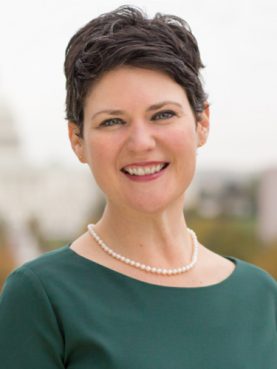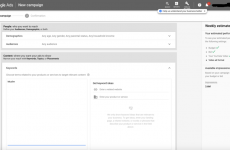(RNS) — A group of Christian leaders has condemned Christian nationalism in a new letter, calling it a “persistent threat to both our religious communities and our democracy.”
The letter, published on Monday (July 29), comes from a coalition of largely liberal-leaning Christian leaders and thinkers. Entitled “Christians Against Christian Nationalism,” it calls on religious Americans to push back against fusions of religion and government they say are distortions of their faith.
“Christian nationalism seeks to merge Christian and American identities, distorting both the Christian faith and America’s constitutional democracy,” the statement reads in part. “Christian nationalism demands Christianity be privileged by the State and implies that to be a good American, one must be Christian. It often overlaps with and provides cover for white supremacy and racial subjugation. We reject this damaging political ideology and invite our Christian brothers and sisters to join us in opposing this threat to our faith and to our nation.”
The letter also suggests that Christian nationalism treats other religions as “second-class faiths.”
“As Christians, we must speak in one voice condemning Christian nationalism as a distortion of the gospel of Jesus and a threat to American democracy,” the letter states.
The letter was organized by the Baptist Joint Committee for Religious Liberty, a group dedicated to “protecting religious liberty for all and defending the separation of church and state.”

Amanda Tyler. Photo courtesy of Baptist Joint Committee
Amanda Tyler, the group’s executive director, said Christian nationalism is “not new” but that she and others at the BJC were inspired to pull the letter together in light of what she said was a spike in Christian nationalist rhetoric and efforts to pass state-level legislation that reflects Christian nationalist sentiment.
“Over the past several years, we seem to be stuck on high in Christian nationalism,” she said. “We’ve seen it in violent, even deadly ways. Christian nationalist views can inspire violence — even against houses of worship.”
Although the statement does not mention Donald Trump by name, the president and many of his evangelical supporters have been criticized by liberal Christians for promoting various kinds of Christian nationalism in speeches and public appearances throughout his first term.
One of Trump’s most vocal supporters, the Rev. Robert Jeffress, pastor of First Baptist Church in Dallas, preached a sermon in June 2018 insisting that America is a “Christian nation.” The First Baptist choir also took part in a 2017 Independence Day celebration with Trump, debuting an anthem called “Make America Great Again.” The song, composed by a former minister of music at the church, repeatedly invokes Trump’s 2016 campaign slogan but does not mention God or religion.
Endorsers of the letter skew toward liberal-leaning mainline Christian voices and include prominent names such as the Most Rev. Michael Curry, presiding bishop of the Episcopal Church; the Rev. Elizabeth Eaton, presiding bishop of the Evangelical Lutheran Church of America; Sister Simone Campbell, head of Catholic social justice lobby NETWORK; Tony Campolo, founder of Red Letter Christians; Jim Winkler, president and general secretary of the National Council of Churches; Melissa Rogers, former executive director of the White House Office of Faith-based and Neighborhood Partnerships under President Barack Obama; the Rev. Jimmie Hawkins, director of the Presbyterian Church (USA)’s Office of Public Witness; and the Rev. Paul Baxley, executive coordinator of the Cooperative Baptist Fellowship.
Over the course of the past week, the statement has already received an additional nearly 6,000 signatories, which Tyler said hailed from all 50 states and more than 30 different denominations.
“This is a grassroots campaign,” she said.
Other religious critics of Christian nationalism include the Rev. William Barber, co-chair of the Poor People’s Campaign. He has repeatedly decried the “false moral narrative of religious nationalism” during public appearances and has made opposing it one of five major issues at the center of the Poor People’s Campaign. During a candidates forum hosted by his group in June, Barber repeatedly asked candidates if they would advocate for a public debate on poverty as well as other subjects — including religious nationalism. (All nine candidates said yes.)
Polls show criticisms of Christian nationalism are likely to resonate with a broad swath of Americans. In April, a Morning Consult survey found that roughly half of registered voters (47%) view Christian nationalism as “a threat to the vital interests of the country,” and 63% of Democrats said the same. Among Republicans, only 35% felt similarly.
Conservative voices such as Washington Times opinion editor Cheryl Chumley have dismissed the statement, calling into question the faith of the signers.
“This is a campaign filled with self-proclaiming Christians whose Christian ideals and beliefs are, in strict biblical teaching, very un-Christian,” Chumley wrote, referencing signatories that include the heads of at least two historic Christian denominations.
Chumley criticized signers who have affirmed LGBTQ identities and relationships.
“If these CACN types see the Bible as their rally call to fight against borders — which is another way of bucking the rule of law — why can’t they see it’s this same Bible that makes clear homosexuality, to God, is an abomination?”
Tyler pushed back on the criticism.
“I don’t think anyone should be challenging the religious identity of the nearly 6,000 Americans who have said they agree with this,” she said.
As a followup, Tyler said she is working on podcasts focusing on the subject of Christian nationalism.
“We wanted to start somewhere and see what kind of resonance this would have with American Christians,” she said. “We’ve seen it has a lot.”

